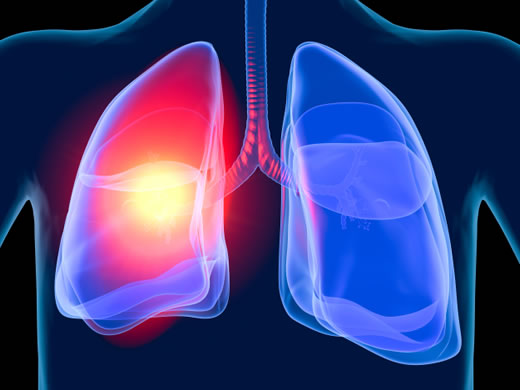A breath test to detect established lung cancer showed promising results in a study conducted by researchers at Winship Cancer Institute of Emory University and Georgia Institute of Technology. They presented their results June 2 at the annual American Society of Clinical Oncology (ASCO) meeting in Chicago.
The Winship researchers, led by Geetha D. Vallabhaneni, and the Georgia Tech team, led by Charlene W. Bayer were funded by a Jim and Sarah Kennedy pilot grant. They found 75 unique breath volatile organic compounds (BVOCs) that differed between patients with non-small cell lung cancer (NSCLC) and subjects without NSCLC. The study enrolled 25 newly diagnosed female patients with NSCLC and 25 females without NSCLC. Women were studied to compare the BVOCs of lung cancer patients with the BVOCs in patients with breast cancer, a second aim of the study. The breath sampler and analytical method were developed by Charlene Bayer at the Georgia Tech Research Institute.
Early diagnosis of the nation's leading cancer killer has long been a challenge.
A simple and inexpensive breath test to detect NSCLC early would make a big impact on early diagnosis, says Vallabhaneni. When diagnosed at Stage I, the earliest stage, NSCLC is curable in more than 70 percent of cases. In contrast, when diagnosed at Stage 3, NSCLC has a cure rate of less than 25 percent.
Vallabhaneni cautions that these promising results should be tested in larger studies before the test can be used in routine settings. Next steps include an analysis of the genetic signatures of the 75 differing BVOCs to determine whether the signature varies based on the stage of the disease.
Winship researchers also contributed to findings to be reported June 2 that suggest lung cancer patients who have one of two genetic mutations may benefit from specific interventions targeted for those mutations.
 | |
Emory University researcher Dana Allen blows into a device that traps specific compounds found in breath. The compounds are then examined to confirm the presence or absence of cancer. Photo by Gary Meek, Georgia Tech. |
The study by the 14-site Lung Cancer Mutation Consortium, of which Winship is a member, showed that those with the ALK mutation typically were younger at age of diagnosis and also typically had less heavy smoking frequency. Liver metastasis was much more common in ALK-positive patients. Such critical information helps researchers identify patients that are likely to harbor an ALK translocation; the drug crizotinib was approved by the FDA last year for treatment in ALK-positive lung cancer patients, and Winship researchers were among those leading the scientific advances.
"We have seen compelling responses with crizotinib in many patients. We hope to quickly move to trials with crizotinib in earlier stages of lung cancer, based on the exciting results in advanced stage NSCLC," says Suresh Ramalingam, who led the pivotal trials at Winship before the drug was approved. Ramalingam is chair of the thoracic malignancies committee of the Eastern Cooperative Oncology Group and a co-investigator on the three studies.
In still other lung cancer advances, Winship researchers in conjunction with researchers at the Atlanta Veterans Affairs Medical Center identified a protein in lung cancer that predicts a poorer outcome among patients with advanced NSCLC. This is important because identifying a target provides an avenue for researchers to develop a specific therapy to fight the disease. The risk for progressive disease with high expression of the protein CHFR was 54 percent versus 18 percent for those with CHFR-low tumors. The study at the VA was conducted over nine years.
These advances into the nation's biggest cancer killer show the expertise of dozens of Winship scientists who collaborate daily, says Fadlo R. Khuri, deputy director of Winship, one of the world's leading lung cancer experts and a co-author on all three studies.
"We have one of the strongest lung cancer programs in the country, and we are working every day to minimize the burden of this disease," says Khuri. "It is exciting when we are able to bring our work closer to treatments and therapies, as these studies do, but we also know we have much work to do. We are committed wholeheartedly to moving forward, and we are encouraged by these strong advances."

